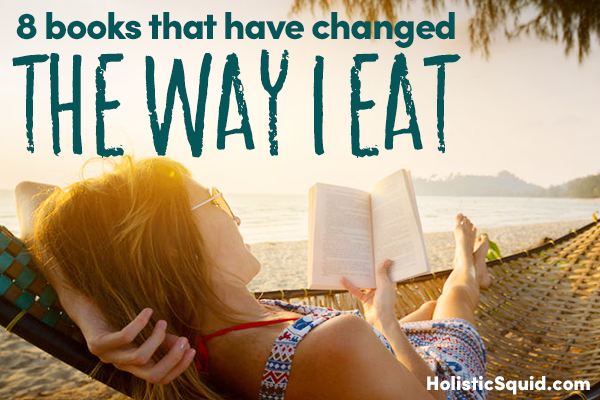
A scan down my bookshelf is like a journey through my nutritional philosophies and food adventures for the past 15 years, each book bringing a different layer of consciousness to the way I eat. First up, the vegetarian days…
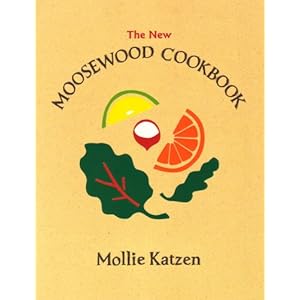 The Moosewood Cookbook
The Moosewood Cookbook
Despite the fact that I no longer think a vegetarian diet is ideal for my body or the health of our planet, The Moosewood Cookbook by Molly Katzen is still one of my favorites. My current copy is not my own, but borrowed from my best friend, Jes, many years ago.
When I was fresh out of college, I explored the world of culinary adventures working in French and Pan-Asian restaurants in Philadelphia. I discovered my first health food grocery store (Fresh Fields), and my friends and I would whip up vegetarian delights including gazpacho spicy enough for tears, tofu in many, many forms, and several classic Thanksgiving dinners completely with TVP meatloaf and mushroom gravy.
Even today as a dedicated carnivore (of grass and forage fed meats), the Moosewood cookbook does not disappoint. Adding some extra butter and cream, the carrot ginger soup and mushroom moussaka have become classics that have withstood the test of vegetarian defection.
My pilgrimage to California (the land of crunchy hippies) was the surprising turning point in my pesca-vegetarianism. My boyfriend and I had renovated an old 1967 Airstream trailer that we bought for $800 from a junk yard. We packed up our belongings and with our dog and a dear friend, pulled our portable home across the country. It was an American dream, but the food in middle-America was not. I was shocked by the lack of fresh produce and complete lack of fish available on our travels. In search of protein that wasn't beans and rice, I caved somewhere in South Dakota after digging through a grocery store freezer only to come up with reconstituted fish sticks. Instead, I opted for a bison burger which was a strange but satisfying experience after two years with no meat.
 The Body Ecology Diet
The Body Ecology Diet
In graduate school for Chinese medicine, I learned that food could be more than yummies in my tummy that either made me fat or thin- food is our best medicine.
The Body Ecology Diet takes this concept to another level by explaining the role of probiotic nutrition in health. Donna Gates does a wonderful job of explaining the essential role of healthy micro-organism balance bodies and how to achieve this through fermented foods including cultured veggies and kefir. I also love the principles she introduces that bring more consciousness to the properties of food in our bodies.
At the end of the day, I think The Body Ecology Diet provides a wonderful education about probiotic nutrition. I have to admit that this book took me down the rabbit hole with promises of becoming a radiantly alkaline being if I could only stick with the highly restrictive diet laid out within.
For individuals with extreme imbalance and disease or even for those seeking seasonal “cleansing,” this book may offer a radical healing solution, but for everyday nourishment I prefer less radial and more traditional meals on my plate.
 Animal, Vegetable, Miracle
Animal, Vegetable, Miracle
Barbara Kingsolver has always been one of my favorite authors, so when Animal, Vegetable, Miracle: A Year of Food Life was released, I gobbled it up despite the fact it was not her typical work of fiction.
This book is Kingsolver's true story of her family's adventures of with local food. They pack up their lives in Arizona (land of refrigeration for survival) and move to their family farm in Southern Appalachia. There they vow to only eat food that they could grow themselves or source locally for an entire year.
Beyond expressing the importance of supporting our local foodsheds, I love Kingsolver's argument for eating sustainable, humanely raised meat which quelled my remaining guilt at the time for reverting to a carnivorous diet.
This book inspired me to purchase a weekly farm box and make trips to the farmer's market a necessity rather than a novelty. Animal, Vegetable, Miracle portrays a contagiously simple and deep connection to food and the world in which we live.
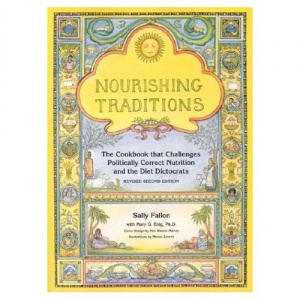 Nourishing Traditions
Nourishing Traditions
I thank my dear friend Anna for introducing me to this real food classic. I first dove into Sally Fallon's Nourishing Traditions when I was newly pregnant with my first born experiencing a startling repulsion for anything that contained the slightest bit of processed food. Even the soy sauce that I tried drizzling over white rice repulsed me. I vividly remember filling a pot with beef bone and water; simmering for days to make my first nourishing bone broth; and finally slurping it down in French onion soup.
Quite immersed at this time with the importance of local foods, Nourishing Traditions became my cookbook for all of the seasonal produce that was delivered each week in our Abundant Harvest farm box. And as I cooked, I began to absorb the nutritional wisdom in the introduction and side bars.
It wasn't until after second child was born that a colleague lent me her copy of Nourishing Our Children, a DVD by Sandrine Hahn of the San Francisco Weston A. Price Chapter. Nourishing Our Children clearly outlines the dietary principles of the WAPF and Nourishing Traditions in an easily digestible format. Suddenly I saw traditional foods in an entirely new light, and the intimidating recipes with raw dairy, organ meats, sprouted flour became more mentally accessible to me.
These days, my much loved and warped copy of Nourishing Traditions can usually be found on my kitchen counter – a field guide to preparing simple nourishing food for my family.
 Real Food: What to Eat and Why
Real Food: What to Eat and Why
This is a great book for those new to the concepts of traditional food or those wanting to deepen their understanding of why they should choose to abandon the Standard American Diet and what to eat instead.
Readable and persuasive, Nina Planck dispels the modern “truths,” including the link between saturated fat and heart disease, the dangers of raw milk, the benefits of real food over vitamin supplements, and much more.
I found this book filled in the cracks for the parts of Traditional Foods that were still “unbelievable” to me. I love to recommend Real Food to people that I meet that are ready to learn about how and why to eat traditional foods but would find Nourishing Traditions a bit out of their comfort zone.
 Cure Tooth Decay
Cure Tooth Decay
At the age of 31, a few months after the birth of my first child, my very first cavity was discovered. Not bad, I thought, and dutifully got my Mcfilling from the McDenist who did my bi-annual McCleanings and accepted my McDental insurance.
Four year later, after the birth of my second child, I got the news of my second cavity in the same tooth. Prognosis: root canal.
“Do I have any other options?” I asked my friendly McHygenist.
“No,” she answered with look of incredulity at my bizarre question.
So I came home and consulted with my friends on the good ole internet, and I was delighted to discover a little known world of holistic dentistry – with this book at the helm.
Now, discussing tooth remineralization with a conventional dentist is about as subversive as discussing masturbation on this blog, but Ramiel Nagel provides readers with a road map through nutrient dense foods that can actually reverse tooth decay.
Before you go thinking that a kale smoothie and steamed veggies will be the path to a pearly whites, let me clarify: the foods to cure tooth decay include cod liver oil, high vitamin butter oil, liver, raw dairy, bone broths and shellfish.
I opted to have my second cavity filled by a holistic dentist that used special technique to preserve maximum amount of tooth and avoid a root canal, but I also followed the advice of this book and steered my diet deeply into foods that are nourishing to my teeth and bones (as well as the rest of my body). When I eat this way, I feel great, and when I don't I can feel the sensitivity starting to buzz in my back molar.
Whether you have dental issues already or just wish to prevent them, Cure Tooth Decay is a fascinating read that just may save you some teeth.
 Folks, This Ain't Normal
Folks, This Ain't Normal
If you've been following my blog, you probably know by now that Joel Salatin is my hero – a true visionary for how we can have “happier hens, healthier people, and a better world.” After reading this book, the concept of supporting my local foodshed was re-sown in my mind, and from Salatin I learned how grazing cows (a.k.a. grass fed beef and dairy) are a key to restoring health to our earth.
After reading Folks, This Ain't Normal my husband is now plotting how to raise chickens and even goats on our property (thanks A LOT, Joel), and I've finally gotten around to planting our first veggie garden thanks to Salatin's urgings.
Some of my favorite quotes from Salatin:
“If It's Worth Doing, It's Worth Doing Poorly First” reminding readers that skills such as cooking and growing food take practice. Don't give up if you're not good at it out of the gate.
“We don't need a law against McDonald's or a law against slaughterhouse abuse – we ask for too much salvation by legislation. All we need to do is empower individuals with the right philosophy and the right information to opt out en masse.”
This book is a great starting point, both informative and inspirational, for how we can become empowered to nourish ourselves and begin to heal our “abnormal” world. I especially recommend listening to the audiobook version, as the charismatic Salatin reads it aloud.
 The Omnivore's Dilemma
The Omnivore's Dilemma
The Omnivore's Dilemma is typically an early read in the adventures of discovering real food, but I have only recently added it to my audiobook collection, hesitating because I couldn't imagine what new insights Pollan may have for me, a self-proclaimed, seasoned real foodie. Preaching to the choir, I suspected.
But a reader on Facebook explained, “Pollan's Omnivore reads more like an adventure, and I found it a nice journey.” So I decided to get on board.
The Omnivore's Dilemma is indeed a meandering and engaging adventure through the state of affairs in our current food system, “a natural history of four meals.” Many, many pages are dedicated to the omnipresence of corn in our food system – a surprisingly shocking account. The life cycle of a feed lot cattle reads like a story of a long lost pet. And the wool that big Organics is pulling over the eyes of us idealistic-minded consumers is important information to absorb.
With still half of the book to go, I am thoroughly enjoying The Omnivore's Dilemma and ever so grateful that my family does not eat fast food. I am curious how Michael Pollan becomes a “plant-based diet pusher” though. I think I may need to read In Defense of Food to find out.
Also on my reading list… Deep Nutrition: Why Your Genes Need Traditional Food.
Don't have time to read?
I used to tease my mom for doing all her reading in the car, but lately with work, kids, and the general exhaustion that goes with it all, I have had zero reading time…until I discovered audiobooks.
Now I can listen to important books and fun fiction while I drive around the city or clean up my endlessly messy kitchen after the kids have gone to bed. No exaggeration, this has changed my life. So if you want an extra hour or two in your day, audiobooks are the answer!
So that's my story, what have been your favorite books along your real food journey?




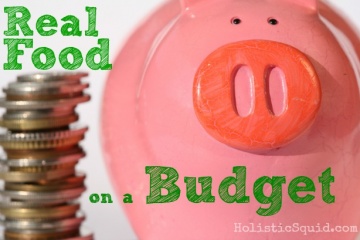
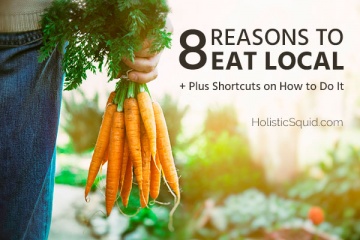
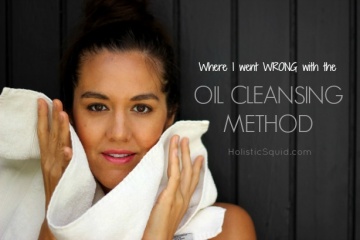

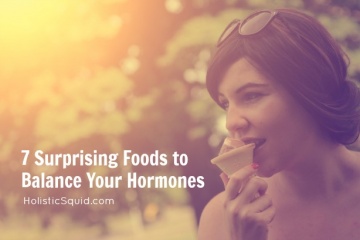
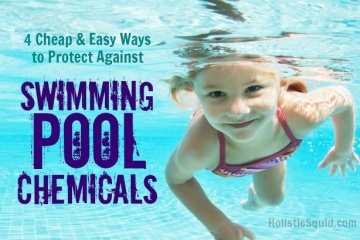
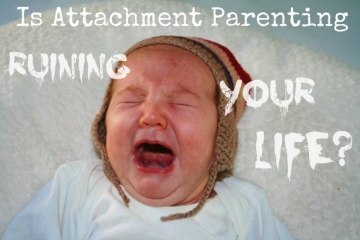
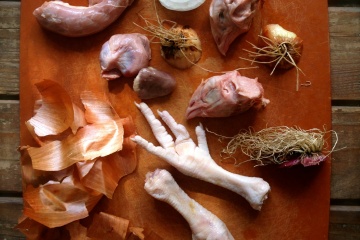
For me it was Nourishing Traditions, The Omnivore’s Dilemma, In Defense of Food, The Fatal Harvest Reader, Eat Taste Heal, and Baby-Led Weaning off the top of my head…on my list: The Fourfold Path to Healing, The Consumers Guide to Food Additives, The Dirty Life, The Wisdom of the Radish…I’m reading The Hive right now and while not directly real food related is certainly further thought fodder towards subscribing to the lifestyle we’ve chosen to pursuit.
The documentary Food Matters changed my life, along with the books, You Are What You Eat, Skinny Bitch, The Omnivore’s Dilemma, In Defense of Food, and The Food Mood Cure. After that, I haven’t stopped learning!! Thanks to IIN too!!
The book that turned me on to a whole new way of living -and eating!- was “Death by Supermarket; The Fattening, Dumbing Down and Poisoning of America” by Nancy Deville. She introduced me to Weston Price, raw milk and grass fed meats. By chapter 3 I had already cleaned out my pantry and I have never looked back!
My first book was “Eat Fat, Lose Fat” which compelled me to become fascinated by all things fermented and traditional. I loved it. Next book was Nourishing Traditions. I am interested in some Paleo books and no I’m not a traitor. But I’m so insulin resistant that I have to combine Paleo with Traditional. And they do combine very nicely actually. I call myself “a Paleo Pricer”. OH, and GAPS. That is also a very fascinating book for those of us just coming to terms with medical issues. I loved the dental book guy but I haven’t gotten the book yet. But I discovered him because of you and was thrilled. He will probably be next. Thank you for all you do, by the way. Its a great source of wonderful information.
Thanks for sharing this great list 🙂
Wow, we have all the same books! Loved seeing your list and reading your comments…we share the same philosophies and heroes! Kudos!!
I’m surprised that Deep Nutrition: Why Your Body Needs Traditional Food by Catherine Shanahan isn’t on this list. It goes well with Nourishing Traditions, and should definitely be your next pick after you finish Omnivore’s Dilemma. There is so much valuable information in there you’re gonna want to bring a hi-lighter. 🙂
“Nutrition and Physical Degeneration” by Weston A. Price. Hands down the most important book I’ve ever read.
“How Can I Grow and Use Sprouts As A Living Food” by Isabell Shipard is another book that must be on your book shelf. She is a living example of the Nourishing Traditions lifestyle. Although i would highly recommend all of her books. check it out at http://www.herbsarespecial.com.au
Healthy living to you all!
“How Can I Grow and Use Sprouts As A Living Food” by Isabell Shipard is another book that must be on your book shelf. She is a living example of the Nourishing Traditions lifestyle. Although i would highly recommend all of her books. check it out at http://www.herbsarespecial.com.au
Healthy living to you all!
Animal Vegetable Miracle was the start for myself. The title says it all!
Ancient Bodies, Modern Lives, and the Slow Food Manifesto would also be interesting additions. Note that the former is an academic work – fascinating, but small text, lost of citations, and very detailed. Only the section on c-sections rubbed me the wrong way. The Slow Food Manifesto is also not the easiest read (I think you and the other commenters have covered the mass-market titles) because it’s translated from Italian, but there are bits in there that I love. ‘How can you feed kids brown sweet mush and expect them one day to develop a taste for aged cheese and wine?’ That’s such an Italian dilemma, but sums it up well! Here’s another list, from a slightly different angle, that might inspire you: http://www.gnolls.org/recommended-reading/
I’ve read most of the books on your list. I would also include Gary Taubes (both Good Calories, Bad Calories and Why We Get Fat) on the list as well.
GC/BC is a tome, but an eye-opening one. He researches the medical studies and shows how they got skewed to what is “nutritional wisdom” for the masses. WWGF is a much easier read, but doesn’t have quite as much information.
Thanks, Sandra! I will check them out. 🙂
Thanks for these suggestions! I am a fan of Dr. Fuhmman’s books, especially ‘Eat to Live’. A documentary that changed my life – ‘Fat, Sick and nearly Dead’ by Joe Cross. Since seeing his amazing transformation, my husband and I have been juicing every day.
I’ve read most on this list, and have added the others as “to read”. Thank you. I might add a few:
Diet for a New America: how your food choices affect your health, happiness, and the future of life on earth, by John Robbins (surprisingly, he was the heir to Baskin-Robbins)
A Cancer Therapy, by Max Gerson, M.D.
The Coconut Oil Miracle, Bruce Fife
and all of Victoria Boutenko’s books on juicing.
Eating Animals is a good one that teaches about how animals go from factory to table. It’s definitely one that sticks in your mind if you want to eat ethically.
I love that you life changing books are the same as mine and added a few that I need to go and get. Thanks for sharing!
“The Revolution will not be Microwaved” by Sandor Katz is amazing. A must read.
For me it was “The Body Ecology Diet: Recovering Your Health and Rebuilding Your Immunity”. I’ve been following this diet for about a month and am very impressed with the improvements my body has made. I feel better. I don’t get the sugar crashes I’ve had forever. I’m down 10lbs. I haven’t even done a cleanse yet. I have been a sugar addict most of my life and the vinegar helps the cravings tremendously. I’m very impressed with this book and diet. It’s common sense once you read it and understand what she’s talking about. I recommend for everyone to try for themselves.
For me, it was “Nutrition and Physical Degeneration” and “Nourishing Traditions”, within about 2 weeks of each other. 😀
Thanks for the recommendations! I’m going to check these out.